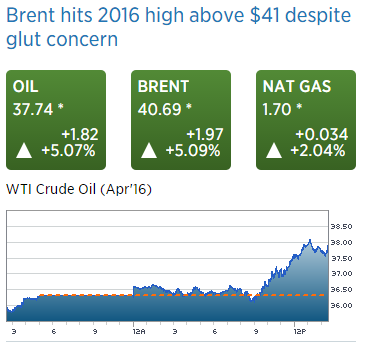Not a good sign for US sales: Mexico Car ProductionMexico’s auto production decreased by 4.1 percent on the year in February of 2016 following a 0.4 percent rise in January and exports dropped 1.2 percent. Automakers produced about 271 thousand units during the month, while exports totaled 220 thousand. Car Production in Mexico averaged 179.92 Thousand Units from 1999 until 2016, reaching an all time high of 330.16 Thousand Units in October of 2014 and a record low of 81.53 Thousand Units in January of 2009. Car Production in Mexico is reported by the AMIA – Associacion Mexicana de la Industria Automotriz. With ‘excessive’ Saudi discounts reportedly still in place, it’s hard to believe prices won’t be again falling until the Saudis change their pricing. Meanwhile, the higher prices will add to the US import bill, as will the increased imports that are replacing declining domestic production.
Topics:
WARREN MOSLER considers the following as important: Oil
This could be interesting, too:
Angry Bear writes The U.S. government is draining 42 million gallons of gasoline from its reserves
Angry Bear writes Oil industry is Writing Executive Orders for Trump to Sign
Angry Bear writes Gasoline, Part D, and Medicare Inflationary Increases
run75441 writes We would’ve never been able to see cricket live on television
Not a good sign for US sales:
Mexico Car Production
Mexico’s auto production decreased by 4.1 percent on the year in February of 2016 following a 0.4 percent rise in January and exports dropped 1.2 percent. Automakers produced about 271 thousand units during the month, while exports totaled 220 thousand. Car Production in Mexico averaged 179.92 Thousand Units from 1999 until 2016, reaching an all time high of 330.16 Thousand Units in October of 2014 and a record low of 81.53 Thousand Units in January of 2009. Car Production in Mexico is reported by the AMIA – Associacion Mexicana de la Industria Automotriz.
With ‘excessive’ Saudi discounts reportedly still in place, it’s hard to believe prices won’t be again falling until the Saudis change their pricing. Meanwhile, the higher prices will add to the US import bill, as will the increased imports that are replacing declining domestic production.

